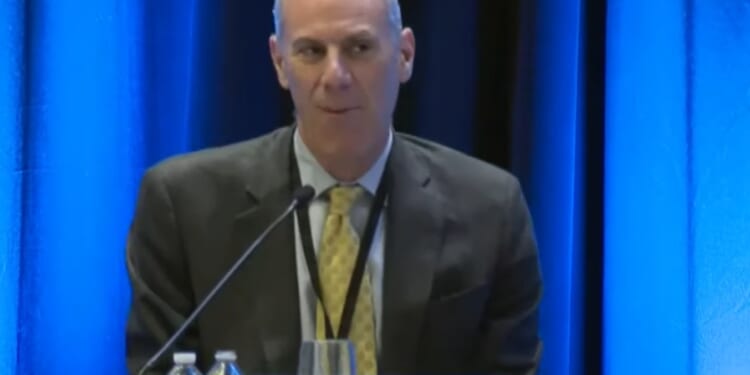A bicameral group of Republicans in Congress is grilling James Boasberg, the U.S. district chief judge for Washington, D.C., on his decision to allow lawfare activist Jack Smith to spy on the Senate, offering him the “opportunity to explain yourself publicly” for a decision that almost certainly violated federal law.
As The Federalist reported, Boasberg approved a scheme under the Department of Justice’s Arctic Frost weaponization against Republicans in which Smith could subpoena the phone records of House and Senate Republicans and attach a nondisclosure order (NDO) so that the congressional bodies could not find out about it from the telecommunications providers being subpoenaed.
The Republican lawmakers note that of the 43 subpoenas issued to Verizon and two issued to AT&T, all had NDOs, and 19 were approved by Boasberg, including on official devices issued by the Senate Sergeant-at-Arms (SAA).
The Federalist obtained a letter sent Thursday from Sens. Chuck Grassley, R-Iowa, chair of the Senate Judiciary Committee, Ron Johnson, R-Wis., chair of the Permanent Subcommittee on Investigations, and Rep. Jim Jordan, R-Ohio, chair of the House Judiciary Committee, to Boasberg pointing to federal law that explicitly prohibits his actions.
The letter notes that “2 U.S.C. § 6628 provides that no law, rule, or regulation may be used to prevent a service provider from notifying a Senate office that data or records have been sought through legal process,” the letter states. “Specifically, this section states, ‘any provider for a Senate office … shall not be barred, through operation of any court order or any statutory provision, from notifying the Senate office of any legal process seeking disclosure” (emphasis original).
Part of the law’s purpose is to give the Senate the ability to stop any such subpoenas on separation of powers grounds. But, as The Federalist CEO Sean Davis stated, “Boasberg issued the illegal gag order precisely to prevent the Senate from going to court to vindicate its rights. … He knew the Senate would have IMMEDIATELY gone to court to nuke the Biden administration’s illegal spying against at least eight U.S. senators.”
To that end, the legislators are looking for answers about the extent to which Boasberg reckoned with that statute in his approval of the NDOs.
The only explanation, at least for the subpoena of the records for Sen. Ted Cruz, R-Texas, is that Boasberg claimed he thought Cruz would destroy or tamper with evidence, intimidate potential witnesses, or put “serious jeopardy to the investigation” — something the legislators called “absurd on its face.”
“Special Counsel Smith’s request for records relating to sitting Members of Congress, including SAA-issued devices, raises serious constitutional and separation of powers concerns,” the letter states. “Had the court considered the application of 2 U.S.C. § 6628, it would have seen that the clear prohibition on granting NDOs was designed, at least in part, to address such grave constitutional concerns.”
To Grassley, Johnson, and Jordan, either Boasberg was derelict in his duty as a judge or Smith was lying to the court.
The trio has given Boasberg until Dec. 4 to answer eight questions:
- Did the Special Counsel’s office inform you that it sought provider records for sitting Members of Congress? Please explain in detail.
- Did the Special Counsel’s office brief the court on the applicability of 2 U.S.C. § 6628 when it applied to the court for an NDO pursuant to 18 U.S.C. § 2705 for the Members of Congress’s records? If yes, explain in detail how that affected your analysis. If not, should they have done so?
- Prior to granting the NDO for SAA-issued devices, were you otherwise aware of 2 U.S.C. § 6628? Did you consider the applicability of 2 U.S.C. § 6628? If not, why not? If yes, explain in detail.
- In light of the volume of subpoenas issued by the Special Counsel’s office, did you question the government about whether Members of Congress would be swept up into the collection of data and information? Did you consider constitutional and separation of powers implications? If not, why not?
- Did the Special Counsel’s office brief the court on Verizon’s contractual requirement to notify the SAA about requests for records related to SAA-issued devices? If yes, explain in detail how that affected your analysis. If not, should they have done so?
- Prior to granting the NDO for SAA-issued devices, were you otherwise aware of Verizon’s contractual requirement to notify the SAA about requests for records related to SAA-issued devices? Did you consider the applicability of that contractual provision? If not, why not? If yes, explain in detail.
- After granting the NDOs, did the Special Counsel’s office ever present you with information concerning 2 U.S.C. § 6628 or Verizon’s contractual requirement to notify the SAA about requests for records related to SAA-issued devices? What action did you take, if any, after learning this information?
- Did you deny any DOJ requests for NDOs involving subpoenas related to Arctic Frost and Members of Congress before or after Special Counsel Smith was appointed? If yes, please list each subpoena and describe in detail why it was denied.
Calls to impeach Boasberg have been growing louder, with Rep. Brandon Gill, R-Texas, filing Articles of Impeachment earlier this month. Taking it a step further, a group of Republican senators has demanded that D.C. Circuit Chief Sri Srinivasan suspend Boasberg while those efforts are ongoing, as The Federalist reported.
“We cannot tolerate rogue, self-professed prejudicial judges ruling on our nation’s most important cases,” Sen. Eric Schmitt, R-Mo., said.
The D.C. District Court did not immediately respond to a request for comment from The Federalist.
Breccan F. Thies is the White House correspondent for The Federalist. He previously covered education and culture issues for the Washington Examiner and Breitbart News. He holds a degree from the University of Virginia and is a 2022 Claremont Institute Publius Fellow. You can follow him on X: @BreccanFThies.















